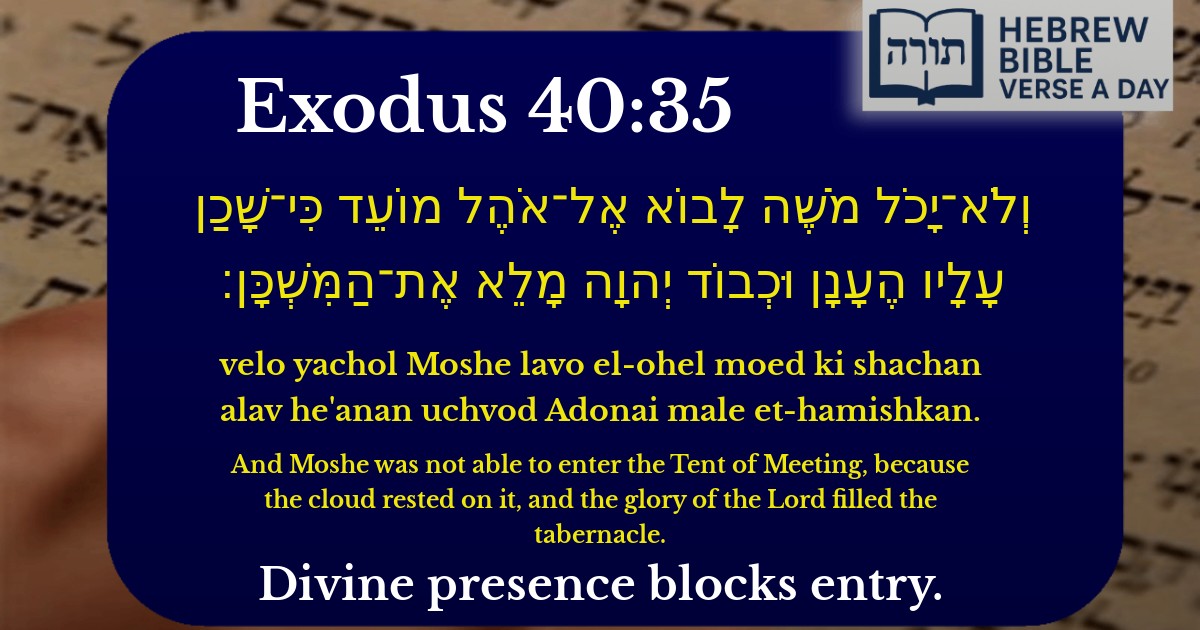Join Our Newsletter To Be Informed When New Videos Are Posted
Join the thousands of fellow Studends who rely on our videos to learn how to read the bible in Hebrew for free!
Hebrew Text
וְלֹא־יָכֹל מֹשֶׁה לָבוֹא אֶל־אֹהֶל מוֹעֵד כִּי־שָׁכַן עָלָיו הֶעָנָן וּכְבוֹד יְהוָה מָלֵא אֶת־הַמִּשְׁכָּן׃
English Translation
And Moshe was not able to enter the Tent of Meeting, because the cloud rested on it, and the glory of the Lord filled the tabernacle.
Transliteration
Velo yachol Moshe lavo el-ohel moed ki shachan alav he'anan uchvod Adonai male et-hamishkan.
Hebrew Leining Text
וְלֹא־יָכֹ֣ל מֹשֶׁ֗ה לָבוֹא֙ אֶל־אֹ֣הֶל מוֹעֵ֔ד כִּֽי־שָׁכַ֥ן עָלָ֖יו הֶעָנָ֑ן וּכְב֣וֹד יְהֹוָ֔ה מָלֵ֖א אֶת־הַמִּשְׁכָּֽן׃
וְלֹא־יָכֹ֣ל מֹשֶׁ֗ה לָבוֹא֙ אֶל־אֹ֣הֶל מוֹעֵ֔ד כִּֽי־שָׁכַ֥ן עָלָ֖יו הֶעָנָ֑ן וּכְב֣וֹד יְהֹוָ֔ה מָלֵ֖א אֶת־הַמִּשְׁכָּֽן׃
🎵 Listen to leining
Parasha Commentary
📚 Talmud Citations
This verse is quoted in the Talmud.
📖 Yoma 4a
The verse is referenced in a discussion about the cloud of glory and its significance in relation to the Tent of Meeting and the Divine Presence.
📖 Sotah 5a
The verse is cited in a discussion about the humility of Moses and the honor bestowed upon him by the Divine Presence.


The Cloud and the Glory of Hashem
The verse (Shemot 40:35) describes Moshe's inability to enter the Ohel Moed (Tent of Meeting) due to the divine cloud and the glory of Hashem filling the Mishkan. Rashi explains that this cloud was the same Anan HaKavod (Cloud of Glory) that rested upon Har Sinai during Matan Torah (Shmot 24:16). The presence of the Shechinah was so intense that even Moshe, who regularly communed with Hashem, could not enter at this moment.
Moshe's Unique Relationship with the Shechinah
Ramban (Nachmanides) notes that this was not a permanent state, as Moshe later entered the Mishkan to receive prophecy (Vayikra 1:1). The Talmud (Yoma 4b) teaches that the Shechinah's presence in the Mishkan mirrored its revelation at Sinai—both were accompanied by a cloud covering the area for six days before Hashem spoke to Moshe on the seventh. This parallel underscores the Mishkan as a continuation of Sinai's holiness.
The Significance of the Cloud
Kabbalistic Insight
The Zohar (Terumah 159a) teaches that the cloud represents the Sefirah of Malchut, the divine attribute through which Hashem's glory becomes manifest in the physical world. The filling of the Mishkan with the Divine Presence symbolizes the ultimate purpose of creation—to make a dwelling place for Hashem below (Midrash Tanchuma, Naso 16).